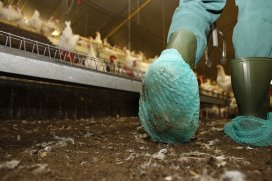Poultry World reported on collaborative research from the University of Georgia and Colorado State University and the US Department of Agriculture (USDA) to develop strategies for reducing salmonella in poultry. The study used Salmonella Heidelberg as a model, as a strain that is particularly hard to get rid of after colonizing broiler farms. The study examined how the type of poultry litter in broiler houses can prevent infection and development of antibiotic resistance, and devising a flock health monitoring system that can help us to predict infection risk sooner. The research found that the microbiome present in the reused litter negatively correlated with the populations of antibiotic-resistant Salmonella Heidelberg in the chickens’ guts, compared with broilers raised on fresh litter. The study is attempting to use artificial intelligence to identify social cues of Salmonella-free broiler chickens raised without antibiotics. Subsequent stages will include testing the Predictor on images of broiler chicks that have been inoculated with Salmonella Heidelberg strains and optimizing the Predictor for a verification test in a commercial broiler house. @ https://www.poultryworld.net/Health/Articles/2020/5/Exploring-ways-to-reduce-salmonella-in-poultry-584059E/
Investigation into how to reduce salmonella in poultry
Exploring ways to reduce salmonella in poultry
Researchers from 2 US universities have joined forces with the US Department of Agriculture (USDA) to explore alternatives to antibiotics for reducing salmonella in poultry.
No comments

